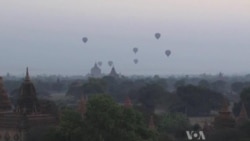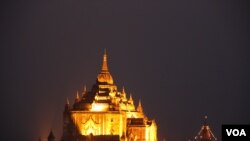BAGAN —
Burma’s ancient royal capital, Bagan, is home to more than 3,000 temples and shrines - a treasure of archaeology and architectural history. Burma's government wants it recognized as a UNESCO World Heritage Site, but some scholars say that would reward shoddy restorations that have damaged the monuments.
As Burma opens up, thousands of tourists are flocking to Bagan, the largest concentration of Buddhist monuments in the world.
Bagan's millennium-old brick structures are Burma's equivalent of Angkor Wat, the famous ancient stone temple of Cambodia.
But while Angkor Wat was professionally restored, experts say the military government damaged Bagan by building on top of old temples or reconstructing them altogether.
Author on Bagan architecture and art, Don Stadtner, says declaring it a U.N. World Heritage Site would be a mistake.
"It would be telling the world that basic archaeological principles not only don't mean anything but may be rewarded by this kind of baseless, conjectural restorations," he said.
In more recent times, authorities have built hundreds of brand new temples and pagodas, including this one dedicated to former military leader General Than Shwe.
Defenders of the construction frenzy note Buddhists earn merit by building new temples and say claims of damage are exaggerated.
"We've done reconstruction based on the research on others original temples' structures," said Naing Win, managing director of Bagan's archaeology department. "The new construction cannot be different from the original structure of old temples. That's why, we cannot say that it [reconstruction] damaged the original according to its shape and architecture."
Restoration crews in 2010 were ordered to stop building new structures and to just preserve the old ones.
Many say only well-preserved structures and Bagan's unique murals should be considered for world heritage status.
Program specialist for culture at UNESCO Rangoon, Takahiko Makino, acknowledges the damage from new structures and says they are still discussing Burma's application for Bagan.
"Certainly the further study by the experts as well as in discussion with the Myanmar authorities and people in here in Myanmar has to be done in order to decide which monuments to include or which monuments not to include," said Makino.
Like Bagan's famous handicrafts, critics worry the temple controversy will be lacquered over as the world rushes to embrace a shiny, new Burma.
And if Bagan wins World Heritage status, the increased tourism, if not managed well, could further damage the ancient structures.
But the designation would also bring more funding and expertise that supporters say would help better conserve a world treasure.
As Burma opens up, thousands of tourists are flocking to Bagan, the largest concentration of Buddhist monuments in the world.
Bagan's millennium-old brick structures are Burma's equivalent of Angkor Wat, the famous ancient stone temple of Cambodia.
But while Angkor Wat was professionally restored, experts say the military government damaged Bagan by building on top of old temples or reconstructing them altogether.
Author on Bagan architecture and art, Don Stadtner, says declaring it a U.N. World Heritage Site would be a mistake.
"It would be telling the world that basic archaeological principles not only don't mean anything but may be rewarded by this kind of baseless, conjectural restorations," he said.
In more recent times, authorities have built hundreds of brand new temples and pagodas, including this one dedicated to former military leader General Than Shwe.
Defenders of the construction frenzy note Buddhists earn merit by building new temples and say claims of damage are exaggerated.
"We've done reconstruction based on the research on others original temples' structures," said Naing Win, managing director of Bagan's archaeology department. "The new construction cannot be different from the original structure of old temples. That's why, we cannot say that it [reconstruction] damaged the original according to its shape and architecture."
Restoration crews in 2010 were ordered to stop building new structures and to just preserve the old ones.
Many say only well-preserved structures and Bagan's unique murals should be considered for world heritage status.
Program specialist for culture at UNESCO Rangoon, Takahiko Makino, acknowledges the damage from new structures and says they are still discussing Burma's application for Bagan.
"Certainly the further study by the experts as well as in discussion with the Myanmar authorities and people in here in Myanmar has to be done in order to decide which monuments to include or which monuments not to include," said Makino.
Like Bagan's famous handicrafts, critics worry the temple controversy will be lacquered over as the world rushes to embrace a shiny, new Burma.
And if Bagan wins World Heritage status, the increased tourism, if not managed well, could further damage the ancient structures.
But the designation would also bring more funding and expertise that supporters say would help better conserve a world treasure.






